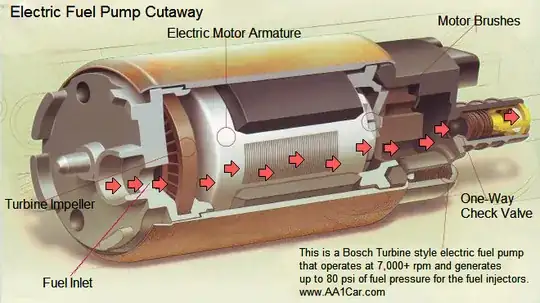With all the good input, and with a bit more research, I'd like to answer my own question. So, here were the concerns I raised on letting a car's fuel tank get close to empty:
Concern 1: your fuel pump would overheat if it ran dry
In-tank fuel pumps are cooled by the flow of gas around the motor:

Source: www.aa1car.com
So, there is a valid concern that running the pump dry will leave the motor uncooled, causing damage. However, pumps seem to draw less than 10 amps (see here, here, and here) which at 12 volts is probably less than 100 watts. That isn't much power; it would take at least fifteen minutes for it to heat a cup of water to boiling. You probably shouldn't continually try to crank a car with an empty gas tank, but I doubt a second or two of fuel-free running would overheat a pump.
Concern 2: water would condense in the empty areas of the tank, freezing or causing corrosion
Water can get into your fuel tank in two ways: mixed into the pumped gas when filling, or as humid air being pulled in as fuel is being pulled out and used. For the former, the amount of water is just how much gas you pump; it doesn't matter how you split it up into fillings. For the latter, as cbeleites noted, emptying a tank halfway twice pulls in exactly as much air as emptying a tank completely once, so again you'll get the same amount of water pulled in no matter how you split that up into fillings.
As freeman noted, OEM fuel tanks these days are plastic, not metal, so corrosion isn't going to be an issue. In terms of freezing, if there's ethanol in the gas then the water will likely blend with the gas, so it won't freeze. Any water that doesn't mix in will sink to the bottom and probably get pulled through the fuel pump. This could be a problem, but the magnitude of the problem won't depend on whether or not there's lots of gas floating on top of the water.
Concern 3: sediment would accumulate and block your fuel filter
This doesn't seem likely to me, assuming you buy from semi-reputable gas stations. But, if a gas station does sell you dirty gas, or if someone spoons mud into your gas inlet, it would sink to the bottom and likely be sucked into the pump whether or not there's lots of gas in the tank. Yes, the sloshing of a less-than-full tank would move the sediment around and make it more likely to get pulled into the pump, but unless you drive a limo on really smooth roads, or keep your tank almost completely full, that's still going to happen. And, as ivan noted, that's what fuel filters for; they are designed to capture silt and be replaced at regular intervals.
Concern 4: you might run out of fuel unexpectedly, leaving you in dire straits
This is a real concern, but it has to be evaluated based on where you live and what your priorities are. I live in the New England suburbs, where there's a gas station every few miles, and even on the highway I'm clear about how far I need to go and how far my tank will take me. And, if I make a mistake and do run out of gas, it will be inconvenient, not dire. If you want to make sure you can always drive a couple of hundred miles at a moment's notice, then you should keep some gas in your tank. If not, don't worry about it.
Postscript: the benefit of filling only when your tank is empty
My car gets about 25MPG, and has a 14-gallon tank. If I drive it 120k miles then that's 4800 gallons of gas over its lifetime. If I fill my tank up completely each time, that's 340 fills; if I fill it halfway then that's 680 fills.
If it takes me five minutes to get to and from the gas station (ignoring the time spent actually standing at the pump), then 340 fills would take about 28 hours, and 640 fills would take about 56 hours. So, by only refilling when empty I'd save about 28 hours over the life of my car. Seems worthwhile to me.
Thanks for everyone's input! Additional feedback welcome!
